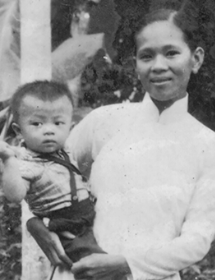In 1974, less than a year before the fall of Saigon, Luong La lived a summer alone in a hut on his family’s tiny farm on Ship Island in Vietnam’s Mekong River Delta. While catching and harvesting the bulk of his own food — his mother left him a staple of rice — he avoids grenade-spiked booby traps and navigates a thin strip of political neutrality between roving pro-Communist Viet Cong soldiers and the U.S.-backed South Vietnamese Army. La was 11-years-old.
The Viet Nam Project
His recollections of those days and nights appear halfway through “Catching Shrimp with Bare Hands: A Boy from the Mekong Delta.” The new memoir, published in this 40th anniversary year of South Vietnam’s final capitulation, captures the tenor and tension of daily life for the La family in the countryside in the years before and after the nation’s communist takeover. While sad at times and occasionally horrific, overall the story is one of resilience and inspiration and adds to a growing counter-narrative of Vietnamese-Americans as courageous survivors, not victims.
Told in the first person, the book traces the history through the eyes of a child and young man. The story covers 12 years starting in 1967 when La is four-years-old and artillery shells and flying shrapnel terrorize the family nightly. His mother is a farmer; his father fixes radios and televisions at home. Luong likes to hang around the house quietly—sometimes hidden under a table—to listen to his father and visitors talk and drink tea.
The family eats and sells mangos and guavas from trees on their land. The boy travels regularly by boat with his mother, siblings and cousins, sometimes to the family’s two farms, both south of their Tan Long home, deeper into the delta as it flows to the sea. The author uses Vietnamese names and phrases cleverly to create authenticity. In the end, the family escapes by boat, but not before facing starvation. La arrives in the United States in 1980 after 11 months in a Malaysia refugee camp.
The boy’s mother emerges as a wonder of nature, at one point giving birth on banana-plant leaves in the hull of her boat. “It’s alright if the leaves are green,” she yells to a daughter who has gone to fetch them. The mother bears 11 children; 10 survive.
The family’s story, researched and told with journalistic vigor, nixes the notion of the helpless Vietnamese, said author Michelle Robin La, a reporter who met Luong La at the University of Washington in Seattle in 1987. They married in 1991. “In the media we see only the heart-wrenching refugees with nothing. We don’t focus on what it took for them to get a boat and get over here. They were very innovative and clever,” she said. “I wanted to preserve that slice of history and feel that it hasn’t been told.”

La’s family also illustrates the reach of Silicon Valley even in the nascent era of globalization: his father was self taught in electronics repair but sent one of his older daughters, Hue, to an instructional program in Saigon before the war ended. Those skills carried her to a career at Apple computer in the valley. The girl born in the boat is now an anesthesiologist. Luong La is a software developer. He and his wife co-founded business-to-business e-commerce company, Flexbiz Corp. “These people brought a lot of skills and talents. Silicon Valley gave them something, but they gave Silicon Valley something as well,” the author said.
Indeed, the book adds to an emerging body of academic research on the Vietnamese-American experience and a growing collection of fiction and nonfiction written in English, often by young Vietnamese-Americans. The two strands of knowledge and thought are broadening the cultural narrative of what it means to be Vietnamese-American beyond the stories of refugee, immigrant and model minority.
“When I first started writing 20-something years ago, I was alone because my community was a very young one at that time,” said Andrew Lam, the San Francisco author of “Perfume Dreams: Reflections on the Vietnamese Diaspora,” a path-breaking book for Vietnamese writers published in 2005. “Everyone was still trying to learn English and find a career in something stable like engineering. There was no community of Vietnamese-American writers.”
Lam is the son of a South Vietnamese general and was airlifted, also at age 11, out of the country two days before Saigon fell and taken to a Guam refugee camp. He is currently a distinguished visiting author-in-residence at San Jose State University teaching graduate-level non-fiction writing. He spoke after a San Francisco literary event in October where he and five other Vietnamese-diaspora writers, all of them younger and women save one, read selections from their own published works.
Michelle La reconstructed the history over eight years, interviewing her husband, mother-in-law and family members again and again. She also visited Vietnam.“It took years of revisiting the same stories, filling in details, dealing with people’s memories and trying to jog them by talking to other family members. A really iterative process,” Michelle La said. It is her first book.

“My mother-in-law told my husband that the book gave her a voice after so many years under communism and the Viet Cong. Her father would say, ‘You have to curl your tongue eight times before you speak.’”
“Catching Shrimp with Bare Hands” is a title released under the imprint ViewPort Publishing, which Michelle Robin La and Luong La own. It is available in print through Amazon.com for $16.95.
Photos: Courtesy of Michelle Robin La and RởThị Lê (Luong’s mother).
A very thoughtful and inspiring article! Thank you!